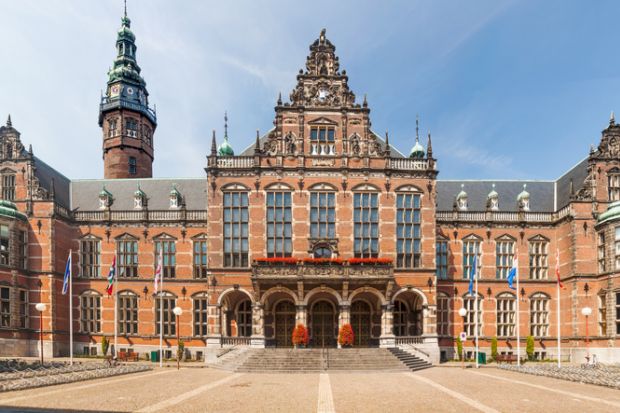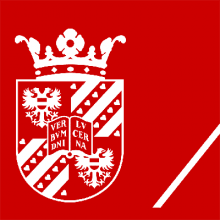As with most educational institutions, the University of Groningen, with our 34,000 students and 6,100 staff, was blindsided by the pandemic. However, even though nobody foresaw what was coming, it was understood from the start that the implications for education would be massive.
Within a week, the regional government ordered the closure of all the university’s buildings, including the academic hospital, to reduce movement to and within the region. Shutting the university for the rest of the academic year was briefly considered, but it was determined that the consequences of such a decision would be too great.
The alternative was online teaching, which was under way in every department within that same week. After several weeks of teaching online-only, the decision was revised and exceptions were made for small group gatherings such as supervision sessions and lab work.
Over the previous decade, the university had been working on plans for hybrid education in the sense of organising student learning through a mix of in-person and online activities. Before the first lockdown in March 2020, however, hybrid education was hardly a reality at Groningen.
Although the pandemic has forced us to realise these plans, the current teaching reality should still be regarded as a reaction to an emergency; some of it is great, some of it is not.
We are still in need of more educational support and reflection on what hybrid education is and how to optimise it, how to deal with online exams without extensive control and monitoring and how to reduce the staff experience of increasingly high workloads, which was already an issue before the pandemic because of several decades of national policies of financial cuts.
At the same time, we are working out how to increase the enjoyment of both work and study, which is currently low as a result of social isolation and online teaching practices that hardly allow for meaningful social contact.
THE Campus resource: how to offer students a rewarding university experience online
Even though the current situation is not optimal, the main perception is that the university has done particularly well as an institution in terms of supporting its staff and students in the transition to working, teaching and studying online, as well as working from home.
Perhaps the most crucial decision in this respect was that, at a very early stage, the university understood that this pandemic would have long-lasting consequences. As a result, we provided different kinds of support based on growing and continuously changing insights into what was really needed.
One simple example was the university’s explicit acknowledgement that working from home was far from ideal for many of our staff because of a variety of demanding domestic situations. Another, more practical, example was the embedded online teaching experts who were appointed for each faculty. These experts help teachers individually and in small groups to organise their teaching online based on educational principles. And a further related measure was appointing student assistants to reduce workloads by helping teachers correct exams and do other tasks.
Nonetheless, exam procedures were and are still a particular challenge because a majority of exams consist of multiple-choice tests, which are highly susceptible to fraud when organised online. Forms of online surveillance are limited in their capacity to prevent fraud and are potentially damaging for the climate of trust and openness. The only real solution is a pedagogical one, in which the exams are redesigned into formats that do not lend themselves to fraud.
Perhaps the most urgent issue is the limited and poor social interaction provided by online settings. In our current educational pedagogy, social interaction in person is assumed to be essential for high-quality learning and teaching.
Especially when teaching groups of students one has never met before, it is almost impossible to establish such a social relationship online, so it was decided to organise in-person meetings in small groups. Many programmes also organised walks, in which the teacher would walk outside with a small group of students, and staff were also advised to walk with colleagues.
Some programmes expanded an already-existing “buddy” system for overseas students to all their students. Many divergent efforts have been taken to organise meaningful social interactions for both students and employees, although this remains a huge concern.
THE Campus resource: points to consider when personal tutoring remotely
In sum, the University of Groningen provided practical support focused on what its employees and students actually needed. This was in strong contrast to the reaction of the Ministry of Education, which did not provide any support but rather refused to offer financial aid or to delay its policy of financial cuts.
Interestingly, with the national elections approaching on 17 March, politicians are beginning to sing a different tune and are trying to win votes by talking about investing more money into universities.
On a personal level, as a reaction to how the Ministry of Education failed in its response, and inspired by how our university handled the pandemic in terms of prioritising the well-being of its employees and students, I decided in January to join a new political party, NL Beter.
One of its key claims is that embedded professionals, with their experience and expertise, should be involved in policymaking. This is exactly what our university did: educational experts were consulted and they based their support on the needs of teachers and students in a time of crisis. More than anything, Groningen took teachers and students seriously from the start.
Klaas van Veen is a professor of educational studies and vice-dean of the social sciences faculty, responsible for education, at the University of Groningen.
Register to continue
Why register?
- Registration is free and only takes a moment
- Once registered, you can read 3 articles a month
- Sign up for our newsletter
Subscribe
Or subscribe for unlimited access to:
- Unlimited access to news, views, insights & reviews
- Digital editions
- Digital access to THE’s university and college rankings analysis
Already registered or a current subscriber? Login










